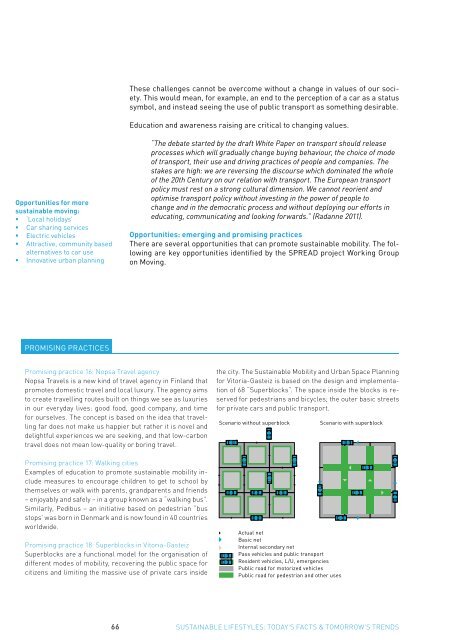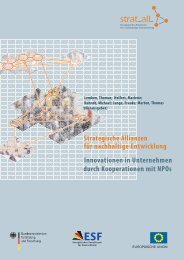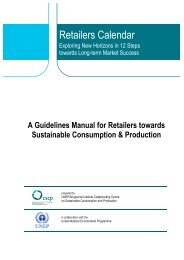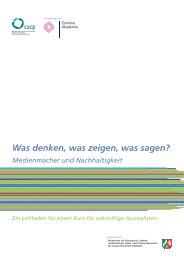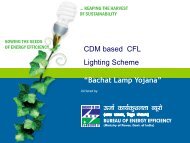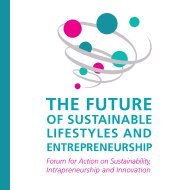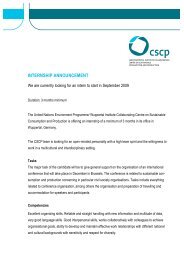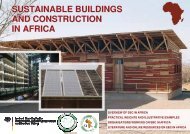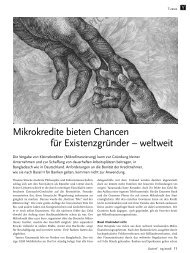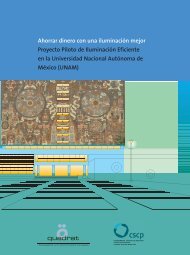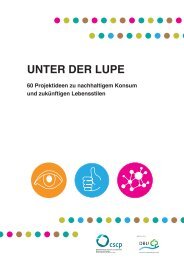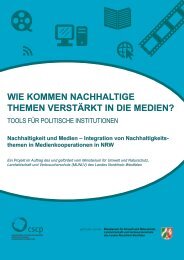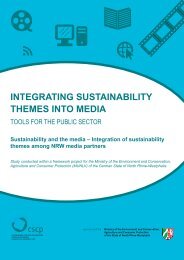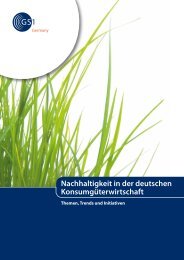today's facts & tomorrow's trends - SPREAD Sustainable Lifestyles ...
today's facts & tomorrow's trends - SPREAD Sustainable Lifestyles ...
today's facts & tomorrow's trends - SPREAD Sustainable Lifestyles ...
You also want an ePaper? Increase the reach of your titles
YUMPU automatically turns print PDFs into web optimized ePapers that Google loves.
These challenges cannot be overcome without a change in values of our society.<br />
This would mean, for example, an end to the perception of a car as a status<br />
symbol, and instead seeing the use of public transport as something desirable.<br />
Education and awareness raising are critical to changing values.<br />
Opportunities for more<br />
sustainable moving:<br />
• ‘Local holidays’<br />
• Car sharing services<br />
• Electric vehicles<br />
• Attractive, community based<br />
alternatives to car use<br />
• Innovative urban planning<br />
“The debate started by the draft White Paper on transport should release<br />
processes which will gradually change buying behaviour, the choice of mode<br />
of transport, their use and driving practices of people and companies. The<br />
stakes are high: we are reversing the discourse which dominated the whole<br />
of the 20th Century on our relation with transport. The European transport<br />
policy must rest on a strong cultural dimension. We cannot reorient and<br />
optimise transport policy without investing in the power of people to<br />
change and in the democratic process and without deploying our efforts in<br />
educating, communicating and looking forwards.” (Radanne 2011).<br />
Opportunities: emerging and promising practices<br />
There are several opportunities that can promote sustainable mobility. The following<br />
are key opportunities identified by the <strong>SPREAD</strong> project Working Group<br />
on Moving.<br />
Promising practices<br />
Promising practice 16: Nopsa Travel agency<br />
Nopsa Travels is a new kind of travel agency in Finland that<br />
promotes domestic travel and local luxury. The agency aims<br />
to create travelling routes built on things we see as luxuries<br />
in our everyday lives: good food, good company, and time<br />
for ourselves. The concept is based on the idea that travelling<br />
far does not make us happier but rather it is novel and<br />
delightful experiences we are seeking, and that low-carbon<br />
travel does not mean low-quality or boring travel.<br />
Promising practice 17: Walking cities<br />
Examples of education to promote sustainable mobility include<br />
measures to encourage children to get to school by<br />
themselves or walk with parents, grandparents and friends<br />
– enjoyably and safely – in a group known as a “walking bus”.<br />
Similarly, Pedibus – an initiative based on pedestrian “bus<br />
stops’ was born in Denmark and is now found in 40 countries<br />
worldwide.<br />
Promising practice 18: Superblocks in Vitoria-Gasteiz<br />
Superblocks are a functional model for the organisation of<br />
different modes of mobility, recovering the public space for<br />
citizens and limiting the massive use of private cars inside<br />
the city. The <strong>Sustainable</strong> Mobility and Urban Space Planning<br />
for Vitoria-Gasteiz is based on the design and implementation<br />
of 68 “Superblocks”. The space inside the blocks is reserved<br />
for pedestrians and bicycles; the outer basic streets<br />
for private cars and public transport.<br />
Scenario without superblock<br />
Actual net<br />
Basic net<br />
Internal secondary net<br />
Pass vehicles and public transport<br />
Resident vehicles, L/U, emergencies<br />
Public road for motorized vehicles<br />
Public road for pedestrian and other uses<br />
Scenario with superblock<br />
66<br />
SUSTAINABLE LIFESTYLES: TODAY’S FACTS & TOMORROW’S TRENDS


